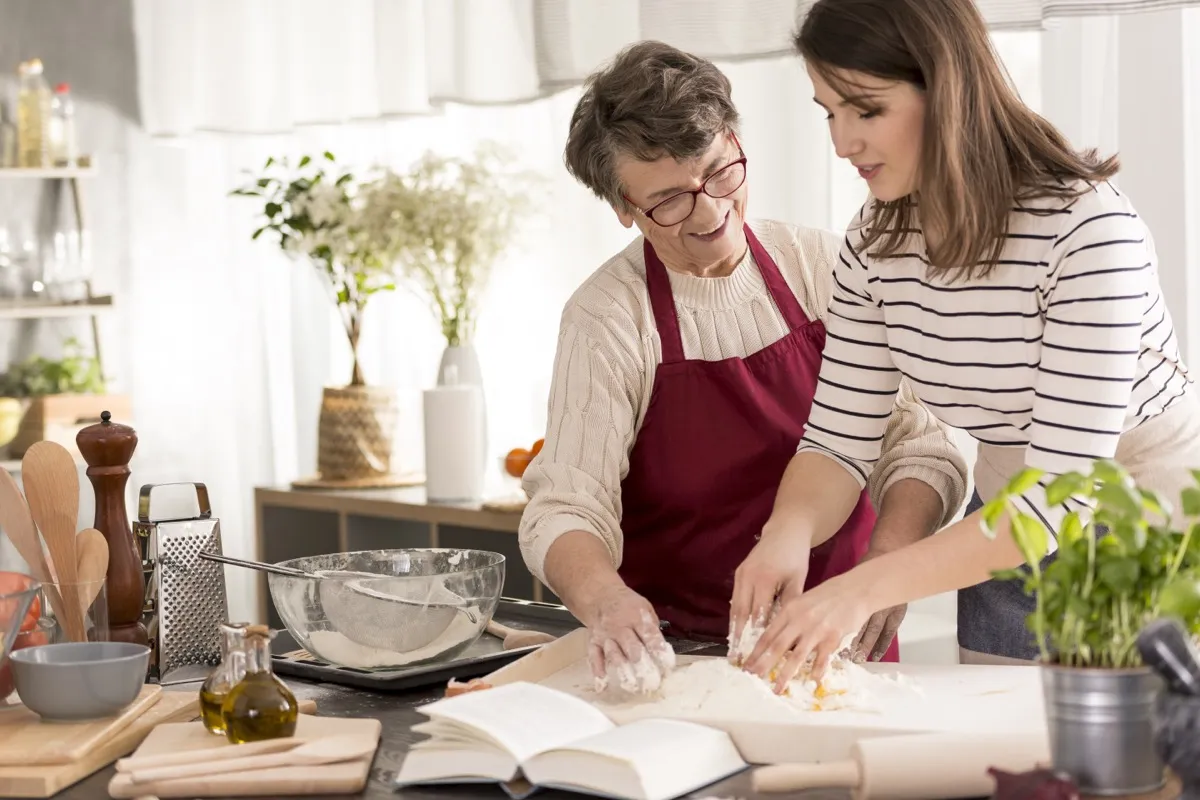8 Topics You Shouldn't Ask Your Grandchildren About, Therapists Say
Avoid these missteps to keep your relationship strong.

The bond between children and their grandparents is undoubtedly a special one. However, even in the closest families, you may find that this cherished relationship can sometimes feel fraught. That's because, despite everyone's best intentions, generational differences can drive a wedge between grandparents and their progeny—especially as grandkids come of age and begin to establish their own lives.
"The age and experience gap can sometimes lead to misunderstandings and unintentional harm," says Ryan Sultan, MD, a board-certified child psychiatrist, adult therapist, and professor at Columbia University. "When it comes to intergenerational relationships, it's crucial for grandparents to tread carefully in their conversations with their grandchildren."
Wondering if your own comments could be causing a rift? Read on to learn the eight topics you shouldn't ask your grandchildren about, according to mental health experts.
RELATED: 6 House Rules You Need to Set With Adult Children.
1
Their job choices

The job market looks very different than it did when you were first starting out, and your grandchildren's career choices may look unrecognizable to you. However, Sultan says that keeping an open mind, offering support, and refraining from judgment can help preserve the relationship.
"It's easy for grandparents to evaluate their grandchildren's career choices based on their own experiences. Phrases like, 'Why don't you get a real job?' undermine the individual's passions and choices, especially in today's diverse job market where non-traditional roles can be as lucrative and fulfilling as traditional ones," he explains.
Rather than offering commentary, Sultan recommends getting curious about their careers and how they feel about them. "Consider saying, 'Tell me more about your work. It sounds interesting!' This encourages dialogue and allows you to understand the grandchild's career better," he notes.
RELATED: 5 Crucial Boundaries You Need to Set With Your In-Laws, Therapists Say.
2
Their financial status

Similarly, you may be tempted to compare your grandchildren's financial achievements to your own status at that age, but Lachlan Brown, relationship expert and the founder of the psychology site Hack Spirit, says this would be misguided. Today's young people are facing a shrinking middle class, astronomical housing prices, and a range of other economic issues that complicate the comparison.
"Saying things like, 'Is that job really paying enough?' or 'When I was your age, I had already bought a house,' can come across as judgmental, even if the intention was to share concern or give advice," Brown explains.
Instead, he says that recognizing what was achievable or normative a generation ago might not apply today can go a long way in opening the conversation constructively. From there you can ask more questions about their personal goals and aspirations in the context of present-day realities.
3
Their political beliefs

Respect is a two-way street. Just as your grandchildren should ideally approach your differences with an open heart and a listening ear, it's important that you do the same.
"Political landscapes change, and what was true or acceptable during a grandparent's youth might not be so today. Comments that dismiss or belittle a grandchild's political leanings can create an emotional divide," explains Sultan.
"A non-confrontational approach would be, 'Our beliefs may differ, but I'd love to understand why you feel the way you do,'" he suggests.
RELATED: 6 Times You Should Never Give Money to Your Adult Children.
4
Their mental health

Mental healthcare used to come with serious stigma, but today's young people see therapy as a self-improvement tool that anyone can use to live their best life. If your grandchild is working on their own mental health, it's crucial not to jump to conclusions about their mental state or project your own insecurities onto them.
"Mental health wasn't always as openly discussed as it is now. Saying something like, 'In my day, we didn't have time to be depressed' can be incredibly damaging and invalidate a grandchild's experience," says Sultan. "A more sensitive approach would be to say, 'I might not fully understand what you're going through, but I'm here for you."
5
Their relationship status

Not long ago, making heteronormative assumptions about family members was par for the course. These days, assuming your grandchildren will ultimately pair off with someone of the opposite sex can come off as presumptuous, out of touch, and sometimes even hurtful.
"Keep your language neutral and inclusive until they share this information with you. For example, 'Anyone special in your life these days?' is a respectful way to ask about their relationships," suggests Sultan.
6
Their choice to get married or have kids

Another major generational shift is that people are getting married later on average, and fewer people are getting married overall. However, it's also worth noting that the divorce rate is also in decline, perhaps in part thanks to more deliberate unions.
"It's common for older generations to ask younger ones about when they're getting married or having children. However, this can create unnecessary stress and may even strain the relationship," says Sultan. "For some, marriage or parenting might not be the life path they've chosen, or they could be facing challenges in these areas that they're not comfortable discussing."
Instead, Sultan suggests that grandparents could express their love and support unconditionally, asking more open-ended questions like, "What's making you happy these days?"
RELATED: 8 Best Places to Vacation With Adult Children.
7
Their physical appearance

Commenting on a grandchild's physical appearance can be deeply hurtful, says Marianne Breneman, a certified life coach for tweens, teens, and young adults and the owner of Mindful Health and Harmony.
"Grandparents should be cautious in commenting about how a tween, teen, or young adult looks, whether it's about clothing, piercings, tattoos, hair color, or something else," she tells Best Life. "For generations, older people have been critical of the younger generations' style and that will never change; but if every time you see your grandchild you make snarky or judgmental comments about how they look, they will stop coming around or clam up."
Discussing your grandchild's weight can cut especially deep. "Observations like, 'You've put on some weight, haven't you?' or recalling past appearances by saying, 'You were always so skinny as a child,' can deeply impact someone's self-esteem. Even if these comments stem from a place of concern, they can be taken as criticisms," says Brown.
For more family advice sent directly to your inbox, sign up for our daily newsletter.
8
Their religious beliefs

Faith and spirituality are deeply personal matters—which is exactly why they can be such a minefield to discuss. If you have strong religious beliefs, there's no reason you can't share them openly with your family members, but it's also important to allow your grandchildren to come to their own conclusions about what they believe. The problem arises when you approach the conversation from a place of authority.
"Share your beliefs by all means, but allow them the space to explore their spirituality freely," says Sultan. "Phrases like, 'This is what I believe and it's been important to me. What do you believe?' leave the door open for meaningful discussion," he says.





















